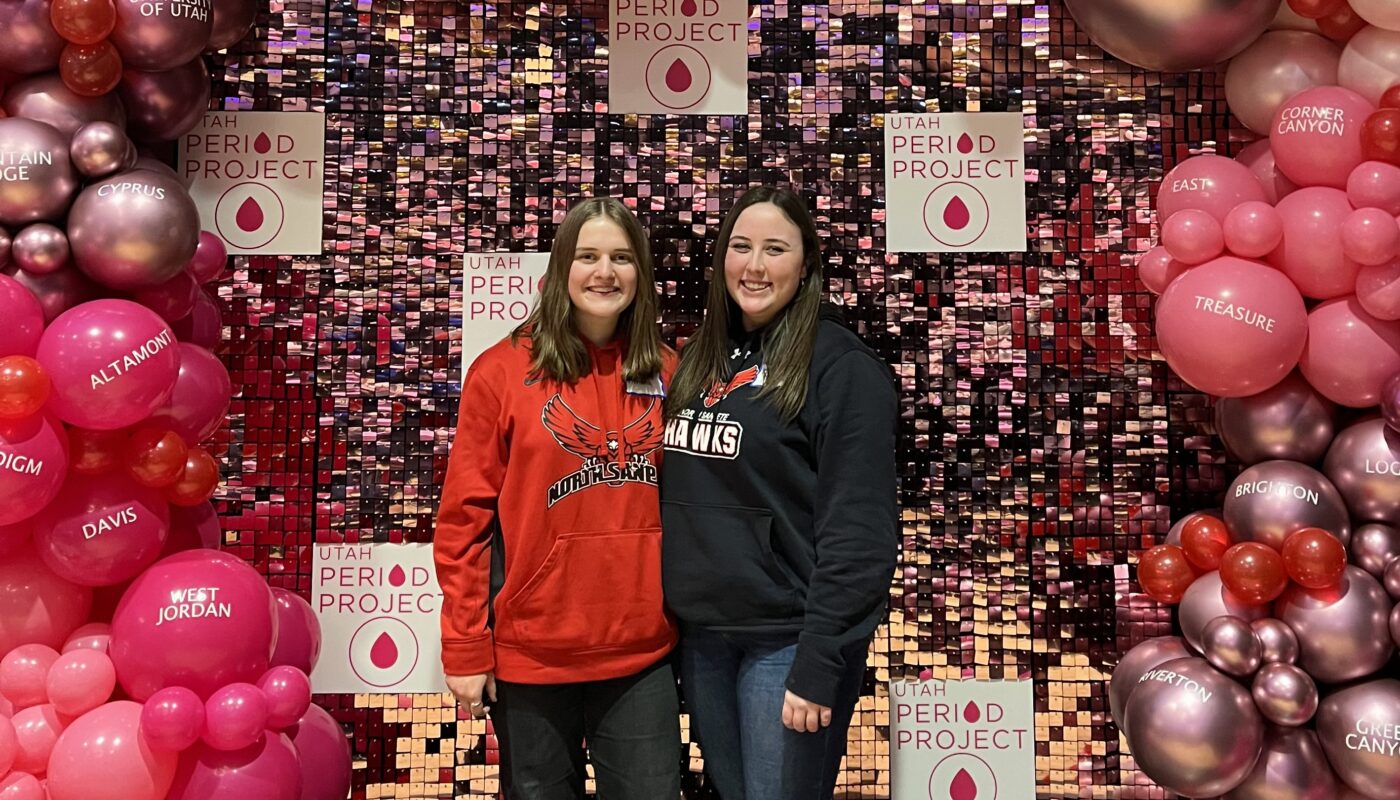photo provided by Jessica Blackham – Student ambassadors Athena De Groff and Jessica Blackham advocate for menstrual equality.
by Jessica Blackham
Social Media Editor
Imagine missing an important chemistry test because you started your period and you didn’t have any pads or tampons––so to avoid the potential embarrassment of bleeding through your pants, you just go home.
According to The Policy Project organization, 0ne in four girls cannot afford period products. Many women who live in poverty have to choose between buying food for their families or getting feminine hygiene products for the month.
Kristin Andrus partnered with Emily Bell McCormick, the creator of The Policy Project, to co-found The Utah Period Project in an effort to help girls who find themselves in these situations where they can’t get the period products they need.
“When I learned how much there was a need for period products I immediately wanted to help,” Andrus said. “I learned though that you can put bandaids on the problem and they’ll still help but to make real sustainable change it all comes down to policy and taking action.”
Together they created a policy that is now House Bill 162 “Period Products in Schools” and if the bill passes it will provide schools with the funds to supply free menstruation products to girls by installing dispensers in all women and unisex bathrooms.
“Some girls start their periods when they’re in fifth or sixth grade,” Andrus said. “So if we get the money or appropriations needed, then we’ll be able to put dispensers in every elementary school, middle school, high school, and charter school in Utah. We want to look out for girls of all ages.”
The Utah Period Project organization held a student leadership kickoff event where more than two hundred girls from over fifty-five different schools across Utah attended this event as student ambassadors.
“It’s empowering to see these girls take this issue so seriously,” Andrus said. “They want to be involved and they’re so willing to listen and learn. Our goal is to show the girls ways that they can help make a difference as student ambassadors.”
Seniors Athena De Groff and Jessica Blackham represented NS as student ambassadors at the event on Jan. 18.
“It was such an amazing opportunity,” De Groff said. “The event was such a good balance of being fun and educational. They had it decorated so cute and they had so many snacks for us to enjoy, but more importantly, I’m grateful we got the opportunity to listen to powerful women talk about what we can do as student ambassadors to raise awareness about period poverty.”
As student ambassadors, De Groff and Blackham will work together to get rid of the stigma around periods.
“One of the most important things for the girls to do is to normalize the conversation surrounding periods and menstruation,” Andrus said. “Half of the world menstruates. It’s a natural thing women deal with. It’s become a taboo subject even though it’s a normal bodily function for literally half the population.”
Since menstruation is not openly talked about, women often feel ashamed for something they can’t control.
“Period Products shouldn’t be a luxury. They are not optional––they are essential,” De Groff said. “I think it’s important for pads and tampons to be available in schools. Girls shouldn’t have to stay home from school for days each month just because they can’t afford these products.”
Recently, House Bill 162 was unanimously passed through the House Education Committee. It will now continue to the House Floor to be voted on. As the bill moves through the legislative process, De Groff and Blackham will continue to be advocates for menstrual equality.
“The bill is not just for girls who can’t afford period products,” Andrus said. “It’s for anyone who starts during third period and doesn’t have any supplies. We don’t shame boys for expecting there to be toilet paper in the bathrooms and that’s how it should be for period products. Period products should be as expected as toilet paper because everyone has the right to take proper care of their body.”




